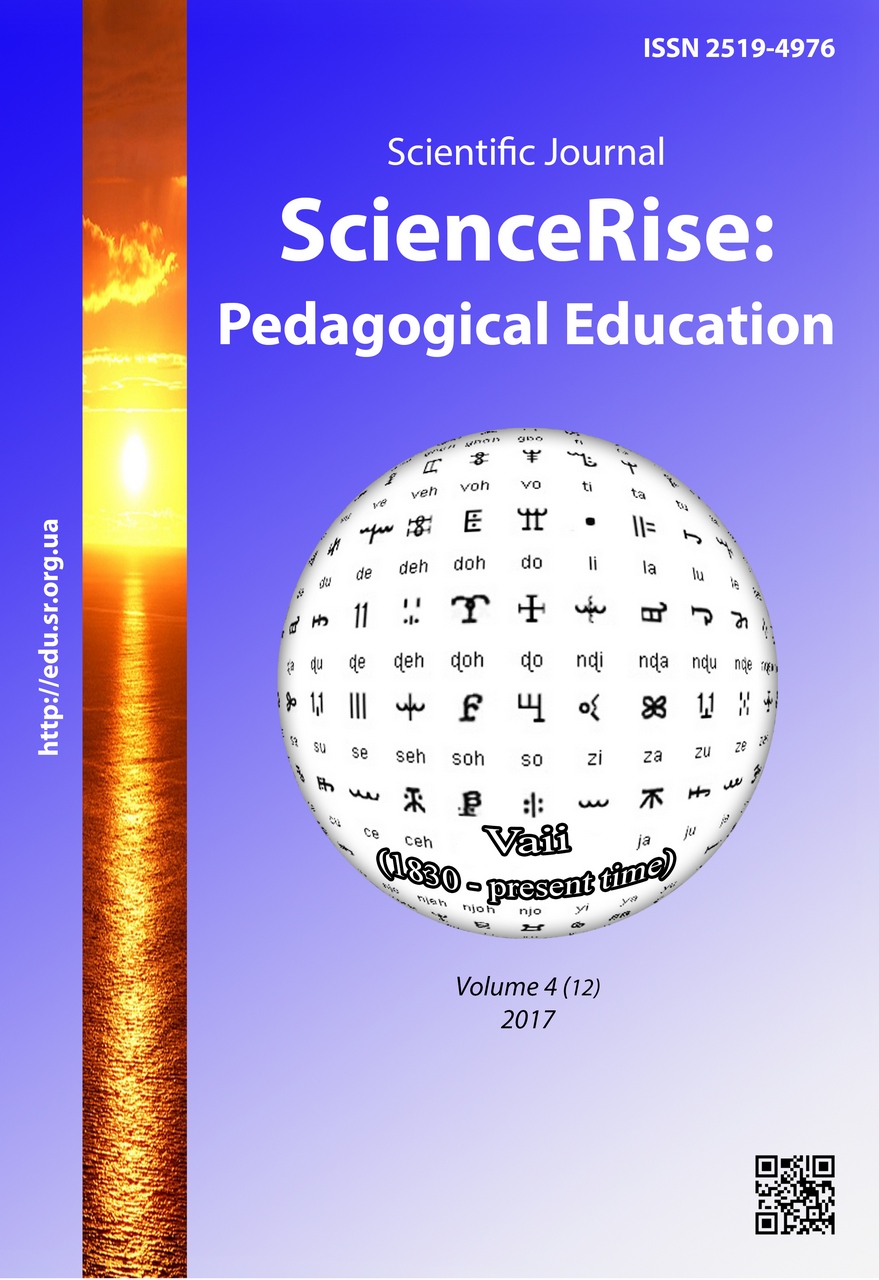Organizational model of continuous learning of managers of network educational organizations in the educational environment of institution of postgraduate teacher education
DOI:
https://doi.org/10.15587/2519-4984.2017.100180Keywords:
cluster approach, corporative learning, dual learning, case-technologies, prolonged learning, Internet-technologiesAbstract
Creation of educational institutions of the new type in Ukrainian educational network (supporting schools with the net of branches) and their associations (educational districts) needs from managerial staff the mastering of grounds of the matrix and network system of the management of educational institutions, and from postgraduate educational institutions – the new approaches to the formation of managerial professional competences.
The features of organization of educational environment of postgraduate pedagogical educational institution for continuous teaching of managers of network educational organizations were revealed in the study. The model is built on the andragogical principles of managerial staff professional development. It includes four basic levels: educational institution, educational district, urban district (united territorial community), regional center of education development.
The methods of corporative learning, Internet-technologies, cluster approach to the learning process organization, different forms of qualification improvement courses organization (traditional (full-time and full-time-correspondence learning), distant learning, dual learning, prolonged learning, accumulation learning by case-technologies and so on) are widely used in the model. The learning process is realized at a specialist’s main working place of and at a distance from it.
The model has the signs of openness, innovation, cascade character, flexibility, variability (electivity and selectivity), matrix character and corresponds to the logistic principle of “knowledge just in time”References
- Osadchyi, I. (2015). Osvitnii okruh yak innovatsiina model terytorialnoi systemy osvity [District Education as an innovative model of territorial education system]. Teaching innovations: ideas, realities and prospects, 2, 42–59.
- Smoliar, L. H., Kotenko, O. A. (2012). Merezhevi struktury yak suchasna forma orhanizatsii ekonomichnoi diialnosti [Network structure as a modern form of organization of economic activity]. Efficient economy, 12. Available at: http://www.economy.nayka.com.ua/?op=1&z=1660
- Mylner, B. (2000). Teoryia orhanyzatsyy [Theory of Organization]. Moscow: YNFRA-M, 480.
- Stoikova, V. V. (2014). Problemy pidhotovky menedzheriv osvity do orhanizatsii merezhevoho profilnoho navchannia [Problems of education managers to organize a network of Special Education]. Computer in school and family, 6, 3–7.
- Yel'nykova, G. V., Kutsenko, V. I., Maslov, V. I. et. al.; Yel'nykova, G. V. (Ed.) (2012). Teoretyko-metodychni osnovy pidhotovky kerivnykiv do otsinyuvannya rezul'tativ diyal'nosti zahal'noosvitn'oho navchal'noho zakladu [Theoretical and methodological foundations of training of managers to performance evaluation of an educational institution]. Kyiv: UMO, 240.
- Sorochan, T. M., Danyliev, A. O., Diachenko, B. A., Rudina, O. M. (2013). Profesiinyi rozvytok kerivnykiv i pedahohichnykh pratsivnykiv zahalnoosvitnikh navchalnykh zakladiv u pisliadyplomnii pedahohichnii osviti rehionalnoho rivnia [Professional development managers and teaching staff of secondary schools in postgraduate education at the regional level]. Luhansk: SPD Rieznikov V. S., 524.
- Chernyshov, O., Sofiants, E. (2011). Modeliuvannia pisliadyplomnoi pedahohichnoi osvity na zasadakh neperervnosti profesiinoho rozvytku [Modeling pislyadyplomnoi pedahohichnoi education based on the continuity of professional development]. Native school, 4-5, 14–18.
- Sysoieva, S. O. (2011). Interaktyvni tekhnolohii navchannia doroslykh: navchalno- metodychnyi posibnyk [Interactive technologies adult education, training and handbook]. Kyiv: Publishing House «EKMO», 324.
- Bykov, V. Yu. (2010). Vidkryte navchalne seredovyshche ta suchasni merezhni instrumenty system vidkrytoi osvity [Open learning environment and modern networking tools of open education]. Scientific journal Dragomanov NPU. Series 2: Computer-oriented education system, 9, 9–15.
- Morze, N. V., Hlazunova, O. H. (2008). Modeli efektyvnoho vykorystannia informatsiino-komunikatsiinykh ta dystantsiinykh tekhnolohii navchannia u vyshchomu navchalnomu zakladi [Models of effective use of information and communication technologies and distance learning in higher education]. Information Technologies and Learning Tools, 6 (2). Available at: http://journal.iitta.gov.ua/index.php/itlt/article/view/138
- Jasvin, V. A. (2001). Obrazovatel'naja sreda: ot modelirovanija k proektirovaniju [Educational environment: from modeling to design]. Moscow: Мeaning, 365.
- Beliaev, H. Yu. (2006). Formyrovanye termyna obrazovatelnaia sreda v psykholoho-pedahohycheskoi lyterature kontsa ХХ–nachala ХХI veka [Formation of the term educational environment in the psychological and educational literature of the late twentieth and early twenty-first century]. Available at: http://dzd.rksmb.org/science/bel06.htm
- Makar, L. M. (2013). Sutnist osvitnoho seredovyshcha v pedahohichnomu protsesi [The essence of the educational environment in the educational process]. The pedagogy of the form of creative work in the schools and the geology schools, 30, 229–236.
- Syrotjuk, S. D. (2012). Samoobuchaiushchyesia orhanyzatsyy kak perspektyvnaia forma upravlenyia kompetentnostiu personala [Self-learning organizations as a promising form of competence management]. Vector of science TSU. Series: Economics and Management, 2, 72–77.
- Orlov, O. V. (2013). Sotsial'ni merezhi yak suchasne seredovyshche navchannya derzhavnykh sluzhbovtsiv [Social networks as a modern learning environment for civil servants]. State building, 1. Available at: http://nbuv.gov.ua/UJRN/DeBu_2013_1_25
- Stoykova, V. V. (2016). Klasternyy pidkhid u formuvanni rehional'noho osvitn'oho seredovyshcha [Cluster approach to forming a regional educational environment]. September: Scientific Journal, 1-2 (72-73), 41–50.
- Upravlins'kyy klaster [Kluster management]. Available at: http://claster.moippo.org.ua/
- Profil'na shkola [Profile school]. Available at: http://prof.moippo.org.ua/
- Upravlins'kyy klaster [Kluster management]. Available at: https://plus.google.com/u/0/communities/117945098537117514404
- Upravlins'kyy klaster [Kluster management]. Facebook. Available at: https://www.facebook.com/groups/1621787338127764
- Diskaveri hrupa «Upravlinnya opornymy shkolamy» [Discovery Group «Management supporting schools»]. Available at: https://plus.google.com/u/0/communities/113827487630581675740
Downloads
Published
How to Cite
Issue
Section
License
Copyright (c) 2017 Victoriia Stoikova

This work is licensed under a Creative Commons Attribution 4.0 International License.
Our journal abides by the Creative Commons CC BY copyright rights and permissions for open access journals.
Authors, who are published in this journal, agree to the following conditions:
1. The authors reserve the right to authorship of the work and pass the first publication right of this work to the journal under the terms of a Creative Commons CC BY, which allows others to freely distribute the published research with the obligatory reference to the authors of the original work and the first publication of the work in this journal.
2. The authors have the right to conclude separate supplement agreements that relate to non-exclusive work distribution in the form in which it has been published by the journal (for example, to upload the work to the online storage of the journal or publish it as part of a monograph), provided that the reference to the first publication of the work in this journal is included.







